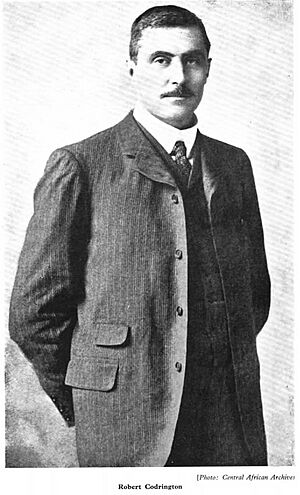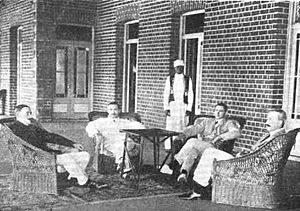Robert Edward Codrington facts for kids
Robert Edward Codrington (born January 6, 1869 – died December 16, 1908) was a British colonial administrator. He helped manage two areas in Africa for the British South Africa Company. These areas later became the country of Zambia. He was the Administrator of North-Eastern Rhodesia from 1898 to 1907. His office was in Fort Jameson, which is now Chipata. After that, he became the Administrator of North-Western Rhodesia in Livingstone from 1908 until he died later that year. He passed away in London at age 39 due to heart disease. His work helped set the stage for these two territories to join together as Northern Rhodesia a few years later.
His leadership was very important in setting up British colonial rule in Northern Rhodesia and Nyasaland (which is now Malawi). He helped make these areas different from Southern Rhodesia, where white settlers had more control.
Contents
Early Life and Work
Robert Codrington was born in the United Kingdom. His family in Gloucestershire had a history of serving in the Royal Navy. However, Robert chose a different path. In 1890, he moved to southern Africa and joined the Bechuanaland Border Police. In 1893, this police force was involved in the occupation of Matabeleland by European settlers. This event led to the overthrow of its ruler, Lobengula, and the taking of land.
Service in Nyasaland
After his time with the police, Codrington was appointed as a Collector of Revenue in the British Central Africa Protectorate. This area was also known as Nyasaland. He quickly moved up in the colonial government. Because of his military experience, he was given the job of bringing the Ngoni and Yao people under British control. He also worked to stop the last parts of the slave trade in the region.
Codrington was a practical leader. There weren't many British people available to help run the government. So, he decided to appoint Africans who had been educated by Scottish missionaries in Nyasaland. This decision helped support education in general. It also created a group of African administrators in Nyasaland. Even though they worked under European officials, they became important figures there and in Northern Rhodesia. This approach was different from what many settlers, especially in Southern Rhodesia, wanted. They often opposed educating and employing native people for anything other than manual labor.
Leading Rhodesia's Territories
Codrington's work caught the attention of Cecil Rhodes, a powerful figure in British expansion. Rhodes appointed him as Deputy Administrator, and later Administrator (like a Governor), of North-Eastern Rhodesia when Codrington was just 29 years old. His main job was to use force to stop any resistance to the British South Africa Company's rule. He used military methods in his leadership. His African nickname, 'Mara,' came from his habit of saying 'it is settled' to end any discussion. This showed how he used his authority. He also brought staff and workers from Nyasaland to help him.
Codrington understood the value of allowing missions in his new territory. They could provide educated people and skilled workers, which the British South Africa Company did not offer. However, he also managed how many missionaries came in. He wanted to prevent conflicts with tribes like the Bemba, who might not welcome them. At first, his administration told the French Catholic bishop Joseph Dupont to leave. This was even though Dupont had set up in Bemba territory before Codrington arrived. Dupont had helped open up Bemba lands to the British and was well-accepted by the Bemba. But Codrington soon saw the practical benefits of Dupont staying. He even invited the bishop to sit next to him at a Bemba coronation ceremony.
Codrington worked closely with Alfred Sharpe, who was the Governor in Nyasaland. With Sharpe's military help, he made sure the Bemba and the Kazembe-Lunda people came under British control.
In 1907, Codrington was appointed Administrator of North-Western Rhodesia, based in Livingstone. He only served for about a year before his death. During that time, he reorganized the administration there. He set it up in a similar way to North-Eastern Rhodesia. This work prepared the way for the two territories to be combined in 1911.
For his important work, he was honored as a knight and became known as Sir Robert Codrington.
Studying Cultures and Writing
Codrington was interested in the study of different cultures, known as ethnology. He collected many cultural artefacts from Africa. Some of these items had been taken by slave traders, whom he had defeated. Other valuable pieces, including very old works from the Luba culture, were collected by the British from the court of Mwata Kazembe in 1897. Codrington kept these items. In 1920, they were placed in a museum in Southern Rhodesia, far from their original Kazembe-Lunda owners.
Codrington also wrote several articles for the Royal Geographical Society, sharing his knowledge about the region.
His Impact
After Cecil Rhodes, Codrington was one of the main people who shaped British rule in central Africa. Some writers have described him as kind and fair. However, he also had a paternalistic view towards Africans, meaning he treated them like children who needed guidance. He strongly believed in the superiority of the British. Even though he was involved in some difficult events in Matabeleland, three parts of his later work had a more peaceful impact on the history north of the Zambezi River.
He encouraged education for Africans and hired them in government jobs. He also started a system of "indirect rule" through local chiefs, allowing them to keep some authority. Finally, he opposed rule by white settlers. Instead, he kept control firmly in the hands of trained administrators. These actions helped set Zambia and Malawi on a different path from Southern Rhodesia. They gained their independence peacefully more than fifteen years before Zimbabwe.
See also
 | Valerie Thomas |
 | Frederick McKinley Jones |
 | George Edward Alcorn Jr. |
 | Thomas Mensah |



